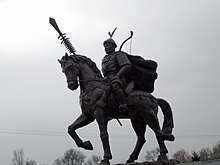Emperor Taizong of Jin
| Emperor Taizong of Jin | |||||||||||||||||
|---|---|---|---|---|---|---|---|---|---|---|---|---|---|---|---|---|---|
 | |||||||||||||||||
| Emperor of the Jin dynasty | |||||||||||||||||
| Reign | 27 September 1123 – 9 February 1135 | ||||||||||||||||
| Predecessor | Emperor Taizu of Jin | ||||||||||||||||
| Successor | Emperor Xizong of Jin | ||||||||||||||||
| Born | 25 November 1075 | ||||||||||||||||
| Died | 9 February 1135 (aged 59) | ||||||||||||||||
| Burial | |||||||||||||||||
| Spouse | Empress Qinren | ||||||||||||||||
| Issue | See § Family | ||||||||||||||||
| |||||||||||||||||
| House | Wanyan | ||||||||||||||||
| Dynasty | Jin | ||||||||||||||||
| Father | Wanyan Helibo | ||||||||||||||||
| Mother | Lady Nalan | ||||||||||||||||
| Emperor Taizong of Jin | |||||||
|---|---|---|---|---|---|---|---|
| Chinese | |||||||
| |||||||
| Wuqimai | |||||||
| Traditional Chinese | |||||||
| Simplified Chinese | 吴乞买 | ||||||
| |||||||
| Wanyan Sheng | |||||||
| Traditional Chinese | |||||||
| Simplified Chinese | |||||||
| |||||||
Emperor Taizong of Jin (25 November 1075 – 9 February 1135), personal name Wuqimai, sinicised name Wanyan Sheng, was the second emperor of the Jurchen-led Jin dynasty of China. His era name was "Tianhui" (
Life[edit]
Wuqimai was the fourth son of Helibo and his primary consort, Lady Nalan (拏懒
In October 1125, Emperor Taizong waged war against the Han Chinese-led Song dynasty and ordered his fifth brother, Wanyan Gao (
In 1128, Emperor Taizong gave ironic titles of nobility to the two captured former Song emperors; Emperor Huizong was called "Duke Hunde" (昏德
During his reign, Emperor Taizong laid and strengthened the Jin dynasty's political system and institutions. In his later years, he designated Hela, a grandson of Aguda, as his successor. He died in Mingde Palace in 1135 and was buried in the He Mausoleum (
Family[edit]
Parents
- Father: Helibo
- Mother: Empress Yijian of the Nalan clan (
翼 簡皇后 拏懒氏 )
Wives
- Empress Qinren of the Tangkuo clan (欽仁
皇后 唐 括 氏 )- Puluhu (
蒲 魯虎), sinicised name Wanyan Zongpan (完 顏 宗 磐 ), the Prince of Song (宋 王 ), first son
- Puluhu (
- Unknown:
- Hulu (
胡 魯), sinicised name Wanyan Zonggu (完 顏 宗 固 ), the Prince of Bin (豳王) - Hulubu (斛魯
補 ), sinicised name Wanyan Zongya (完 顏 宗 雅 ), the Prince of Dai (代 王 ) - Aludai (
阿 魯帶), sinicised name Wanyan Zongshun (完 顏 宗 順 ), the Prince of Xu (徐 王 ) - Alubu (
阿 魯補), sinicised name Wanyan Zongwei (完 顏 宗 偉 ), the Prince of Yu (虞 王 ) - Hushahu (斛沙
虎 ), sinicised name Wanyan Zongying (完 顏 宗 英 ), the Prince of Teng (滕王) - Alin (
阿 鄰), sinicised name Wanyan Zongyi (完 顏 宗 懿), the Prince of Xue (薛王) - Alu (
阿 魯), sinicised name Wanyan Zongben (完 顏 宗 本 ), the Prince of Yuan (原 王 ) - Gulan (鶻懶), the Prince of Yi (
翼 王 ) - Hulijia (
胡 里 甲 ), sinicised name Wanyan Zongmei (完 顏 宗 美 ), the Prince of Feng (豐 王 ) - Shentumen (
神土 門 ), the Prince of Yun (鄆王) - Huboshu (斛孛
束 ), the Prince of Huo (霍王) - Wolie (斡烈), the Prince of Cai (蔡王)
- Gusha (鶻沙), sinicised name Wanyan Zongzhe (
完 顏 宗 哲 ), the Prince of Bi (畢王)
- Hulu (
